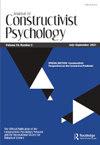接受和传播一种遗传疾病的经验
IF 0.7
4区 心理学
Q3 PSYCHOLOGY, CLINICAL
引用次数: 0
摘要
摘要遗产是衰老经历的关键组成部分。已经描述了三种类型的遗产:生物遗产、物质遗产和价值遗产。本文关注生物学遗产,重点是接收和传递与转甲状腺素相关的淀粉样蛋白家族性多发性神经病(TTR-FAP)相关的基因的经验。本研究采用自我对抗法(SCM)探讨TTR-FAP影响个体的生物遗产叙事。这项研究包括四名参与者,他们都处于受体(受疾病影响,意味着他们继承了致病突变)和受体(可能将突变传递给他们的孩子)的位置。参与者为两男两女,年龄在45-65岁之间 岁所有人都有孩子。数据分析是通过遵循供应链管理,识别生活主题和确定情感意义来进行的。主要研究结果包括:(1)在接受者的位置上,参与者专注于对疾病的治疗和适应,同时具有消极和积极的情感意义;(2) 在传播者的位置上,他们关注儿童和孙辈对疾病的认知,并附加负面的情感意义。研究结果与告知基因咨询服务和专业人员这些患者对其病情的感受有关。本文章由计算机程序翻译,如有差异,请以英文原文为准。
The Experience of Receiving and Transmitting a Genetic Disease
Abstract Legacies are key components of the aging experience. Three types of legacies have been described: biological, material, and values. This paper focuses on biological legacy, centering on the experience of receiving and transmitting the genes associated with transthyretin-related amyloid familial polyneuropathy (TTR-FAP). This study adopts the self-confrontation method (SCM) to explore narratives about biological legacies on individuals affected by TTR-FAP. The study included four participants, who are both in the receiver (affected by the condition, meaning they have inherited the disease-causing mutation) and in the transmitter (potentially passing on the mutation to their children) positions. The participants are two men and two women, aged 45–65 years old; all have children. Data analysis was performed by following the SCM, identifying life themes and determining affective meanings. The main findings suggested include: (1) in the receiver position, participants focus on treatment and adaptation regarding the disease attached to both negative and positive affective meanings; (2) in the transmitter position, they focus on awareness of the disease in children and grandchildren attached to negative affective meanings. Results are relevant for informing genetic counseling services and professionals about these patients’ feelings toward their condition.
求助全文
通过发布文献求助,成功后即可免费获取论文全文。
去求助
来源期刊

Journal of Constructivist Psychology
PSYCHOLOGY, CLINICAL-
CiteScore
2.40
自引率
0.00%
发文量
22
期刊介绍:
Psychology and related disciplines throughout the human sciences and humanities have been revolutionized by a postmodern emphasis on the role of language, human systems, and personal knowledge in the construction of social realities. The Journal of Constructivist Psychology is the first publication to provide a professional forum for this emerging focus, embracing such diverse expressions of constructivism as personal construct theory, constructivist marriage and family therapy, structural-developmental and language-based approaches to psychology, and narrative psychology.
 求助内容:
求助内容: 应助结果提醒方式:
应助结果提醒方式:


